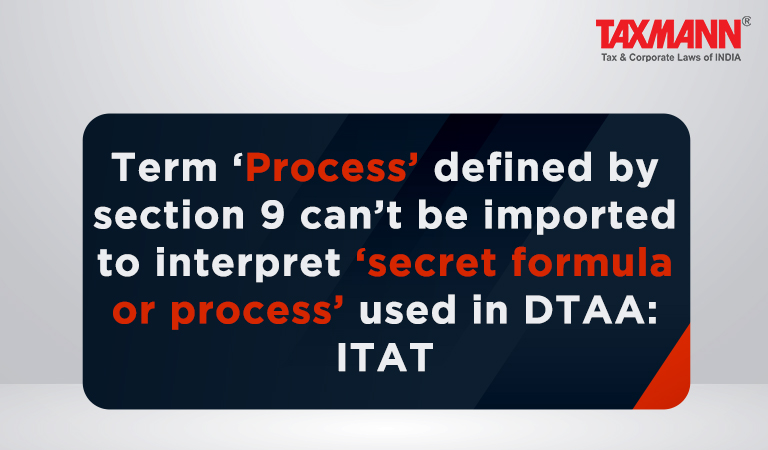Term ‘Process’ defined by section 9 can’t be imported to interpret ‘secret formula or process’ used in DTAA: ITAT
- Blog|News|International Tax|
- 2 Min Read
- By Taxmann
- |
- Last Updated on 26 February, 2022

Case Details: ACIT v. Viacom 18 Media (P.) Ltd - [2022] 135 taxmann.com 321 (Mumbai - Trib.)
Judiciary and Counsel Details
-
- Prashant Maharishi, Accountant Member and Sandeep Singh Karhail, Judicial Member
- Nimesh Vora, AR for the Appellant.
- Milind S. Chavan, SR DR for the Respondent.
Facts of the Case
Assessee was engaged in marketing advertisement time for different television channels and distribution of these channels. It made payment for transponder service fees to three entities. Assessee applied for an order under section 195(2) for nil withholding tax certificates for payment of transponder services fees.
The Assessing Officer (AO) rejected assessee’s application by holding that these payments were chargeable to tax as royalty.
On appeal, the CIT(A) held payment of transponder charges paid by the assessee were not taxable in India, and therefore assessee cannot be asked to withhold tax on these payments. Aggrieved revenue filed the instant appeal before the Tribunal.
ITAT Held
The Mumbai Tribunal held that the revenue contended that the term ‘process‘ as defined in Explanation [6] to section 9 (1)(vi) of the Income-tax Act, should be read in to the Treaty as the term ‘process‘ used in the treaty Article 12(3) is not defined in Treaty.
In Article 12(3) of the India-Malaysia Treaty, the term used is ‘Secret Formula or process’ and not ‘process’. Therefore, the meaning of the term ‘process’ cannot be incorporated into the Treaty. Further, the meaning of the word ‘secret’ in Treaty would become redundant if we interpret ‘Secret Formula or process’ with the meaning of just ‘process’.
Accordingly, payment made for transponder charges didn’t constitute royalty under section 9(1)(vi) of the Act or under the relevant double taxation avoidance agreement. Thus, no tax was required to be deducted tax at the source under section 195.
Disclaimer: The content/information published on the website is only for general information of the user and shall not be construed as legal advice. While the Taxmann has exercised reasonable efforts to ensure the veracity of information/content published, Taxmann shall be under no liability in any manner whatsoever for incorrect information, if any.

Taxmann Publications has a dedicated in-house Research & Editorial Team. This team consists of a team of Chartered Accountants, Company Secretaries, and Lawyers. This team works under the guidance and supervision of editor-in-chief Mr Rakesh Bhargava.
The Research and Editorial Team is responsible for developing reliable and accurate content for the readers. The team follows the six-sigma approach to achieve the benchmark of zero error in its publications and research platforms. The team ensures that the following publication guidelines are thoroughly followed while developing the content:
- The statutory material is obtained only from the authorized and reliable sources
- All the latest developments in the judicial and legislative fields are covered
- Prepare the analytical write-ups on current, controversial, and important issues to help the readers to understand the concept and its implications
- Every content published by Taxmann is complete, accurate and lucid
- All evidence-based statements are supported with proper reference to Section, Circular No., Notification No. or citations
- The golden rules of grammar, style and consistency are thoroughly followed
- Font and size that’s easy to read and remain consistent across all imprint and digital publications are applied



 CA | CS | CMA
CA | CS | CMA
